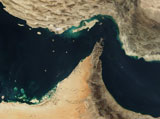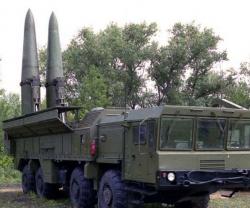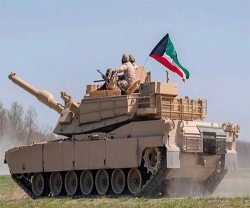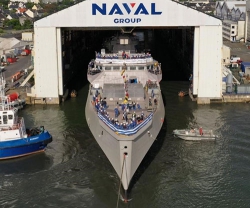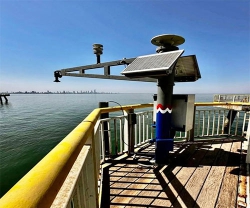The increasingly heated exchange raises new tensions in a standoff that has the potential to spark military reprisals and propel oil prices to levels that could batter a global economy already grappling with a European debt crisis.
Iran’s Navy Chief boasted Wednesday that it would be “very easy” for his country’s forces to close the strategic Strait, the passage at the mouth of the Persian Gulf through which a sixth of the world’s oil passes daily. It was the second such threat in two days following a similar warning by Iran’s Vice President.
“Iran has comprehensive control over the strategic waterway,” Admiral Habibollah Sayyari told state-run Press TV, as the country was in the midst of a 10-day military drill near the strategic waterway.
The comments drew a quick response from the US. “This is not just an important issue for security and stability in the region, but is an economic lifeline for countries in the Gulf,” Pentagon Press Secretary George Little said. “Interference with the transit or passage of vessels through the Strait of Hormuz will not be tolerated.”
Separately, Bahrain-based US Navy 5th Fleet Spokeswoman said the Navy is “always ready to counter malevolent actions to ensure freedom of navigation.”
Iran’s threat to seal off the Gulf, surrounded by oil-rich Gulf states, underlines the depth of worry over the prospect that the Obama administration will go ahead with sanctions over its nuclear program that would severely hit its biggest revenue earner, oil. The sanctions themselves have raised worries that removing Iran’s crude from the market will lead to a spike in oil prices.
Gulf Arab nations appeared ready to at least ease market tensions. A senior Saudi Arabian oil official told the AP that Gulf Arab nations are ready to step in to offset any potential loss of exports from Iran, which is the world’s fourth largest oil producer.
What remains unclear is what routes the Gulf nations could take to bring that production to market if Iran goes through with its threats.
About 15 million barrels per day pass through the Hormuz Strait, according to the US Energy Information Administration. There are some pipelines that could be tapped, but Gulf oil leaders, who met in Cairo on December 24, declined to say whether they had discussed alternate routes or what they may be.
While many analysts believe that Iran’s warnings are little more than posturing, they still highlight both the delicate nature of the oil market, which moves as much on rhetoric as supply and demand fundamentals.
Iran relies on crude sales for about 80% of its of its public revenues, and sanctions or an even pre-emptive measure by Tehran to withhold its crude from the market would further batter its already flailing economy.
So far, Western nations have been unable to agree on sanctions targeting oil exports, even as they argue that Iran is trying to develop a nuclear weapon. Tehran maintains its nuclear program - already the subject of several rounds of sanctions - is purely peaceful.
The US Congress has passed a bill banning dealings with the Iran Central Bank, a move that would heavily hurt Iran’s
ability to export crude. The bill could impose penalties on foreign firms that do business with Iran’s central bank. European and Asian nations use the bank for transactions to import Iranian oil.
President Barack Obama has said he will sign the bill despite his misgivings. China and Russia have opposed such measures. A likely result of the sanctions would be that oil prices would at least temporarily spike to levels that could weigh heavily on the world economy.
Closing the Strait of Hormuz would hit even harder. Energy consultant and trader The Schork Group estimated in a report that crude would jump to above $140 per barrel. Conservatives in Iran claim global oil prices will jump to $250 a barrel should the waterway be closed.
By closing the strait, Iran may aim to send the message that its pain from sanctions will also be felt by others. But it has equally compelling reasons not to try.
Iran would not be able to sustain a line of ships to block the Strait because it mainly has smaller boats that do not have the ability to stay in open waters in a coordinated formation for days, analysts said.
Iran can harass oil tankers and western warships with missiles, laying mines and possible suicide attacks with small boats, or try to attack a Gulf export facility. But it is not easy to sink an oil supertanker, which is much bigger and more resilient than a warship, analysts said.
Iran has 23 submarines and more than 100 patrol and coastal combat boats. The Fifth Fleet has more than 20 ships.
Oil tankers can find work-arounds to Iranian activity in the Strait by sending smaller vessels that could travel closer to the Oman coastline. But hostilities can raise the cost of insurance and transportation costs.
Source: Arab News; Reuters; AP

